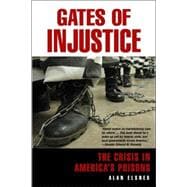
Note: Supplemental materials are not guaranteed with Rental or Used book purchases.
Purchase Benefits
Looking to rent a book? Rent Gates of Injustice : The Crisis in America's Prisons [ISBN: 9780131427914] for the semester, quarter, and short term or search our site for other textbooks by Elsner, Alan. Renting a textbook can save you up to 90% from the cost of buying.
| Preface | |
| Acknowledgments | |
| The Second Toughest Sheriff in America | |
| Becoming a Prison Nation | |
| Entering the Gates | |
| The Vulnerable | |
| The Sanity of the System | |
| An Unhealthy Situation | |
| Women Behind Bars | |
| Supermax | |
| Short-Term Problems | |
| Money, Money, Money | |
| After Prison | |
| Some Modest Suggestions | |
| Endnotes | |
| Index | |
| Table of Contents provided by Publisher. All Rights Reserved. |
The New copy of this book will include any supplemental materials advertised. Please check the title of the book to determine if it should include any access cards, study guides, lab manuals, CDs, etc.
The Used, Rental and eBook copies of this book are not guaranteed to include any supplemental materials. Typically, only the book itself is included. This is true even if the title states it includes any access cards, study guides, lab manuals, CDs, etc.